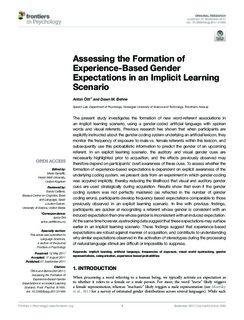| dc.contributor.author | Öttl, Anton | |
| dc.contributor.author | Behne, Dawn Marie | |
| dc.date.accessioned | 2017-11-17T14:59:56Z | |
| dc.date.available | 2017-11-17T14:59:56Z | |
| dc.date.created | 2017-09-14T11:57:07Z | |
| dc.date.issued | 2017 | |
| dc.identifier.citation | Frontiers in Psychology. 2017, 8 . | nb_NO |
| dc.identifier.issn | 1664-1078 | |
| dc.identifier.uri | http://hdl.handle.net/11250/2467020 | |
| dc.description.abstract | The present study investigates the formation of new word-referent associations in an implicit learning scenario, using a gender-coded artificial language with spoken words and visual referents. Previous research has shown that when participants are explicitly instructed about the gender-coding system underlying an artificial lexicon, they monitor the frequency of exposure to male vs. female referents within this lexicon, and subsequently use this probabilistic information to predict the gender of an upcoming referent. In an explicit learning scenario, the auditory and visual gender cues are necessarily highlighted prior to acqusition, and the effects previously observed may therefore depend on participants’ overt awareness of these cues. To assess whether the formation of experience-based expectations is dependent on explicit awareness of the underlying coding system, we present data from an experiment in which gender-coding was acquired implicitly, thereby reducing the likelihood that visual and auditory gender cues are used strategically during acquisition. Results show that even if the gender coding system was not perfectly mastered (as reflected in the number of gender coding errors), participants develop frequency based expectations comparable to those previously observed in an explicit learning scenario. In line with previous findings, participants are quicker at recognizing a referent whose gender is consistent with an induced expectation than one whose gender is inconsistent with an induced expectation. At the same time however, eyetracking data suggest that these expectations may surface earlier in an implicit learning scenario. These findings suggest that experience-based expectations are robust against manner of acquisition, and contribute to understanding why similar expectations observed in the activation of stereotypes during the processing of natural language stimuli are difficult or impossible to suppress. | nb_NO |
| dc.language.iso | eng | nb_NO |
| dc.publisher | Frontiers Media | nb_NO |
| dc.rights | Navngivelse 4.0 Internasjonal | * |
| dc.rights.uri | http://creativecommons.org/licenses/by/4.0/deed.no | * |
| dc.title | Assessing the Formation of Experience-Based Gender Expectations in an Implicit Learning Scenario | nb_NO |
| dc.type | Journal article | nb_NO |
| dc.type | Peer reviewed | nb_NO |
| dc.description.version | publishedVersion | nb_NO |
| dc.source.pagenumber | 13 | nb_NO |
| dc.source.volume | 8 | nb_NO |
| dc.source.journal | Frontiers in Psychology | nb_NO |
| dc.identifier.doi | 10.3389/fpsyg.2017.01485 | |
| dc.identifier.cristin | 1493704 | |
| dc.description.localcode | © 2017 Öttl and Behne. This is an open-access article distributed under the terms of the Creative Commons Attribution License (CC BY). The use, distribution or reproduction in other forums is permitted, provided the original author(s) or licensor are credited and that the original publication in this journal is cited, in accordance with accepted academic practice. No use, distribution or reproduction is permitted which does not comply with these terms. | nb_NO |
| cristin.unitcode | 194,67,40,0 | |
| cristin.unitname | Psykologisk institutt | |
| cristin.ispublished | true | |
| cristin.fulltext | original | |
| cristin.qualitycode | 2 | |

